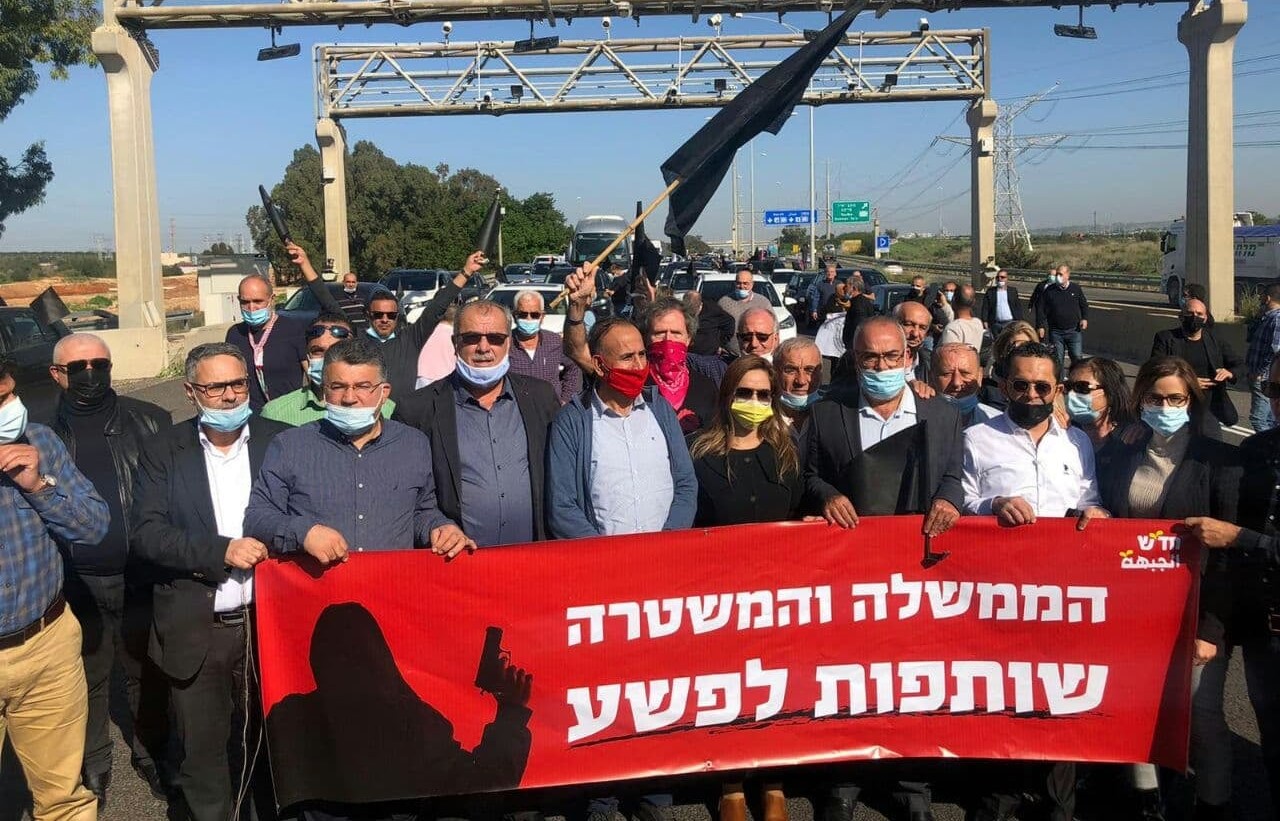Far-right Prime Minister Naftali Bennett sought to make good on his pledges to fight rampaging violent crime in Israel’s Arab communities on Sunday, October 3, by announcing his intentions to involve the military and the General Security Service (GSS, Shin Bet / Shabak) in a crackdown against illegally held weapons in those communities. At its inaugural meeting on Sunday, the Ministerial Task Force to Fight Crime and Violence in Arab Society decided that the army and Shabak will be central factors in the government’s plan to fight crime in Arab cities and towns in Israel.

Leaders and members of Israel’s Arab-Palestinian minority protest along Highway 6, the country’s major north-south toll road, government inaction in the fight against criminal violence in Arab Society, February 2021. The red banner reads in Hebrew: “The government and police are partners in the crime.” (Photo: Al-Ittihad)
No military or Defense Ministry representatives participated in the meeting or the discussions preceding it. After the announcement a source told Haaretz that security officials believe it is not possible to legally integrate military forces in police operations directed against Israeli citizens. The decision came a day after this year’s hundredth violent death of an Arab-Palestinian citizen due to criminal violence. Maharan Mougrabi, 40, was run over and shot on Friday night in Haifa and succumbed to his wounds the next day.
Hadash MKs deplored the decision by the government to involve the Shabak and the army in the tsunami of organized criminal violence in Arab communities in Israel. Joint List head MK Ayman Odeh (Hadash) wrote in a tweet “Fight criminals, not democracy. The sole responsibility for law enforcement among civilians is the police, not intelligence agencies and the military. After decades of governmental and police systemic discrimination against Arab citizens, the last thing we need is more of the same attitude: police for Jews and Shin Bet for Arabs.” In contrast, in interviews with the press, Minister for Regional Cooperation Esawi Frej (Meretz) supported the involvement of the Shin Bet.
“Our position has always been clear: we’re citizens of the state. As such, the police is the address for our concerns about personal security,” said Mudar Younes, director of the National Council of Arab Mayors. “Jewish Israelis think of the Shin Bet entering [the campaign to combat violence] as an apocalypse. But we recognize as an established fact that Arabs in Israel live in a police state.” Leading Hadash activists, Amjad Shbita, who directs the shared society NGO Sikkuy said, “The Shin Bet is already present in our communities, we certainly don’t suffer from a lack of it.”
Adalah – The Legal Center for Arab Minority Rights in Israel – sent an urgent letter to PM Bennett, Defense Minister Benny Gantz, Police Commissioner Kobi Shabtai, and Shin Bet head Nadav Argaman, demanding they refrain from assigning intelligence agents and army forces to operate in Arab towns and neighborhoods on the pretext of combating violence and crime. In the letter signed by the general manager of Adalah, Attorney Hassan Jabareen, the organization argues that the decision is indicative of the hostile and discriminatory treatment of Arab-Palestinian citizens by Israeli authorities, under the guise of security considerations. “The decision creates two separate law-enforcement systems – one for Palestinian Arab towns, neighborhoods, and citizens, and the other for the rest of the country – in which Arab-Palestinian citizens are treated as enemy aliens,” Jabareen wrote.
“It also introduces the Shin Bet into a civilian space, where they have no legal authority, particularly after the Supreme Court’s recent decision regarding surveillance that specifies the Shin Bet’s powers,” he added. Adalah emphasized that the work of the Shin Bet intelligence agency is carried out in secrecy, without oversight or transparency, and therefore it cannot be assigned to civil matters, including the issue of serious crime. “Its very involvement and operation in such matters creates grave violations of basic human and civil rights,” said Adalah.
The center also noted that Israeli law also does not authorize the army to play a role in policing within Israel: “The Government’s dangerous step reveals that the Israeli authorities intend to continue to deal with Palestinian citizens of Israel as enemies, in keeping with its continuous policy dating from the military rule imposed on Arab-Palestinians in Israel from 1948 to 1966.”
“Contrary to the statements of the Israeli Government, the Shin Bet intelligence agency and the army are not empowered to carry out the work of the law enforcement authorities. The decision, in principle, to allow covert activity of unknown nature and gravity poses a further danger to the basic rights of Palestinian citizens, who are already systematically targeted and oppressed by the police today. “The establishment of an enforcement system intended only for one ethnic and national group is a racist decision that produces two systems of law, and we will fight this decision with all the legal means at our disposal,” said Adalah.
According to the Association for Civil Rights in Israel (ACRI), the Shin Bet designated functions have nearly doubled since 2004, without amending the GSS Law and without informing the public — not even the majority of the Knesset. ACRI has petitioned to the High Court of Justice (Supreme Court), stating that “extending the Shin Bet powers behind closed doors to heights [previously] unknown threatens democracy, human rights, and is against the law.” ACRI has called on the High Court to repeal the government’s decisions to expand the services’ functions from six to ten, in violation of the GSS Law. This expansion of powers, beyond what is designated in the law, was done in secret, without publication or public discussion.
Related:


